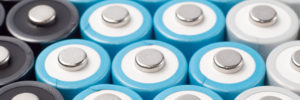Initial results give us a hint behind Toyota’s battery capacity retention target.
Source: Electric Vehicle News
NovaCHARGE deploys 627 charging ports for Florida’s Park & Plug program
NovaCHARGE, an Orlando-based provider of charging hardware, software and cloud-based charger administration, has completed the successful deployment of 627 EV charging ports for Duke Energy Florida’s Park & Plug program.
Duke selected NovaCHARGE as the prime contractor for its Park & Plug program, which was launched in 2018.
NovaCHARGE was responsible for delivery of a turnkey EV charging solution in a variety of locations across Florida:
- 182 public Level 2 chargers at local retail locations
- 220 Level 2 chargers at multi-unit dwellings
- 173 Level 2 chargers at workplaces
- 52 public DC fast chargers at strategic locations that connect major highway corridors and evacuation routes
Over the multi-year project, NovaCHARGE delivered its NC7000 and NC8000 networked chargers, as well as its ChargeUP EV Administrative Cloud Network, which enables remote administrative control and reporting, and supports both NovaCHARGE chargers and hardware from other major vendors.
Source: NovaCHARGE
Source: Electric Vehicles Magazine
GM and Glencore enter multi-year cobalt supply agreement
GM and mining giant Glencore have announced a multi-year sourcing agreement under which Glencore will supply GM with cobalt from its Murrin Murrin operation in Australia, to be used in GM’s Ultium battery cathodes.
Both Glencore and GM are members of the Responsible Minerals Initiative (RMI), and Glencore’s Murrin Murrin operation conforms to the OECD-aligned Responsible Minerals Assurance Process.
“GM and our suppliers are building an EV ecosystem that is focused on sourcing critical raw materials in a secure sustainable manner,” said Jeff Morrison, GM VP, Global Purchasing and Supply Chain. “Importantly, given the critical role of EVs in reducing the carbon footprint of the transportation sector, this agreement is aligned with our approach to responsible sourcing and supply chain management.”
GM has recently announced several initiatives to create a new and more secure EV supply chain:
- GM and POSCO Chemical are building a new facility in Quebec as part of a joint venture to produce cathode active material for GM’s Ultium batteries.
- GM will procure lithium from Controlled Thermal Resources’ Hell’s Kitchen Project in California.
- GM is working with GE Renewable Energy to develop a rare earth value chain.
- VAC of Germany plans to build a plant in the US to support GM’s magnet requirements starting in 2024, including locally sourced raw materials and finished magnet production.
Source: GM
Source: Electric Vehicles Magazine
Are nickel-based batteries on the way out?
Is a new standards war—or rather, a chemistries war—developing? There are several important differences between the NMC and LFP battery chemistries, but the most salient points seem to be that batteries based on NMC (nickel, manganese, cobalt) offer higher energy density, but those based on LFP (lithium iron phosphate) tend to be cheaper.
Chinese automakers have made extensive use of LFP for some time, but the Americans and Europeans have favored NMC in their desire to offer superior range and performance. Lately however, LFP’s star has been rising—in 2021, Tesla began using LFP cells in some of its lower-priced models. VW, Ford and Stellantis have also announced plans to use LFP in lower-cost EVs.
Russia’s invasion of Ukraine has highlighted another reason for Western automakers to shift to LFP—the required raw materials are readily available closer to home (much of the world’s nickel comes from Russia, and cobalt also has well-publicized supply chain issues).
Chinese news source Gasgoo reports (via CleanTechnica) that Gotion High Tech plans to start production of an LFP cell with specific energy of 230 Wh/kg by the end of this year—that would be within range of current NMC cells, which reach 250 to 270 Wh/kg). “At that moment, ternary lithium batteries will be replaced by LFP ones on a larger scale in Gotion,” said Gotion CEO Li Zhen.
Meanwhile, PushEVs reports that Chinese battery maker SVolt expects to reach the 230 Wh/kg level next year. PushEVs’ Pedro Lima is among those who believe that NCM will become a niche technology, used in vehicles that require high energy density, such as luxury sport cars, while the cobalt-free chemistries NMx (LNMO) and LFP (LiFePO4) will move into the mainstream.
Source: CleanTechnica
Source: Electric Vehicles Magazine
Can Traditional Automakers Compete With Tesla? Model Y Compared To Rivals
Can Audi and Volvo compete with the Model Y?
Source: Electric Vehicle News
Ford Unloads Another 7 Million Rivian Shares As Stock Plummets
Rivian stock continues to fall at worrying rates.
Source: Electric Vehicle News
Hyundai Plug-In Car Wholesale Shipments Reach New Record In April 2022
The volume nears 20,000 units, including almost 10,000 Hyundai Ioniq 5.
Source: Electric Vehicle News
Kia EV6 Wholesale Shipments Remain Stable In April 2022
Over 57,000 units were produced within 9 months.
Source: Electric Vehicle News
Tesla Model Y Used Buying Guide: What's Missing From Used Versions?
Used Teslas are expensive, and many don’t have the most up-to-date non-software-related features.
Source: Electric Vehicle News
Tesla Model Y Vs Hyundai Ioniq 5: 375-Mile Range And Charging Race
How do the Ioniq 5 and Model Y stack up when driving at the same speed at the same time on the same roads?
Source: Electric Vehicle News




